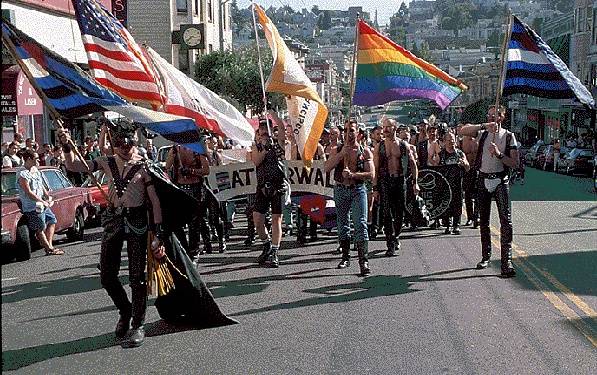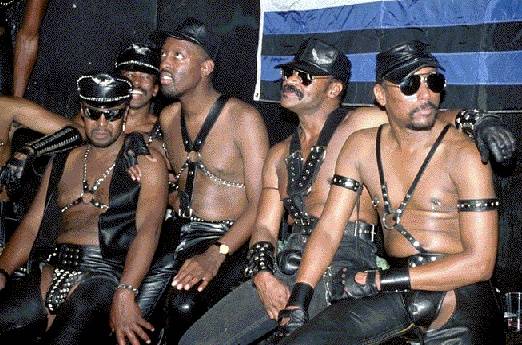Leather Kings: Difference between revisions
m (1 revision(s)) |
m (Text replacement - "category:Gay and Lesbian" to "category:LGBTQI") |
||
| (3 intermediate revisions by one other user not shown) | |||
| Line 1: | Line 1: | ||
'''<font face = Papyrus> <font color = maroon> <font size = 4>Historical Essay</font></font> </font>''' | |||
''by Gayle S. Rubin'' | |||
[[Image:gay1$sf-leatherwalk-1996.jpg]] | [[Image:gay1$sf-leatherwalk-1996.jpg]] | ||
'''September 1996 San Francisco Leatherwalk on Castro Street.''' | '''September 1996 San Francisco Leatherwalk on Castro Street.''' | ||
''Photo: Rick Gerharter'' | |||
What is "leather?" Leather means many things, but since the mid-l950's, it has been a central symbol for a complex gay male sexual subculture. The imagery of leather comes primarily from the gear worn by motorcycle gangs in the 50's, and by urban street gangs whose style of dress similarly included boots, jeans, and motorcycle jackets. Motorcycles and leather jackets came to symbolize power for the powerless. These styles and meanings were popularized in the 50's by movies like ''Rebel Without a Cause'' and ''The Wild One''. Gay men who rode bikes or wore leather did so for the same reasons as straight youth: to express toughness, masculinity, independence, and personal (as opposed to institutional) power. | What is "leather?" Leather means many things, but since the mid-l950's, it has been a central symbol for a complex gay male sexual subculture. The imagery of leather comes primarily from the gear worn by motorcycle gangs in the 50's, and by urban street gangs whose style of dress similarly included boots, jeans, and motorcycle jackets. Motorcycles and leather jackets came to symbolize power for the powerless. These styles and meanings were popularized in the 50's by movies like ''Rebel Without a Cause'' and ''The Wild One''. Gay men who rode bikes or wore leather did so for the same reasons as straight youth: to express toughness, masculinity, independence, and personal (as opposed to institutional) power. | ||
| Line 7: | Line 13: | ||
In addition, leather has specifically sexual connotations whose cultural roots are not entirely clear. By the early 1950's, associations of leather with fetishism and sadomasochism were well established in both gay and straight erotica. Some of the gay men who adopted leather garb did so for reasons shared by straight women and men who wanted to express an interest in kinky sex. | In addition, leather has specifically sexual connotations whose cultural roots are not entirely clear. By the early 1950's, associations of leather with fetishism and sadomasochism were well established in both gay and straight erotica. Some of the gay men who adopted leather garb did so for reasons shared by straight women and men who wanted to express an interest in kinky sex. | ||
A gay male subculture organized around these imageries of leather coalesced after World War II. By the mid-50's, the first bars catering to the leather crowd had appeared in major metropolitan areas. In San Francisco, the first leather bar opened in 1962. This was the Why Not, located in the Tenderloin and managed by a legendary figure named Tony Tavarossi. The leather bars did not migrate [[SOMA's Gay Leather Kings South of Market]] until the early sixties, when the Tool Box opened at Fourth and Harrison. | A gay male subculture organized around these imageries of leather coalesced after World War II. By the mid-50's, the first bars catering to the leather crowd had appeared in major metropolitan areas. In San Francisco, the first leather bar opened in 1962. This was the Why Not, located in the Tenderloin and managed by a legendary figure named Tony Tavarossi. The leather bars did not migrate [[SOMA's Gay Leather Kings |South of Market]] until the early sixties, when the Tool Box opened at Fourth and Harrison. | ||
''--Gayle Rubin,'' excerpted from "Requiem for the Valley of the Leather Kings," originally published in ''The Sentinel'', 1989 | ''--Gayle Rubin,'' excerpted from "Requiem for the Valley of the Leather Kings," originally published in ''The Sentinel'', 1989 | ||
| Line 15: | Line 21: | ||
'''November 1992 Blackfire Cover Man Contest.''' | '''November 1992 Blackfire Cover Man Contest.''' | ||
''Photo: Rick Gerharter'' | |||
[[Gay Street Life |Prev. Document]] [[Leather Resilience |Next Document]] | |||
[[ | [[category:LGBTQI]] [[category:SOMA]] [[category:1950s]] [[category:1990s]] [[category:1960s]] [[category:Castro]] | ||
Latest revision as of 07:09, 16 October 2018
Historical Essay
by Gayle S. Rubin
September 1996 San Francisco Leatherwalk on Castro Street.
Photo: Rick Gerharter
What is "leather?" Leather means many things, but since the mid-l950's, it has been a central symbol for a complex gay male sexual subculture. The imagery of leather comes primarily from the gear worn by motorcycle gangs in the 50's, and by urban street gangs whose style of dress similarly included boots, jeans, and motorcycle jackets. Motorcycles and leather jackets came to symbolize power for the powerless. These styles and meanings were popularized in the 50's by movies like Rebel Without a Cause and The Wild One. Gay men who rode bikes or wore leather did so for the same reasons as straight youth: to express toughness, masculinity, independence, and personal (as opposed to institutional) power.
In addition, leather has specifically sexual connotations whose cultural roots are not entirely clear. By the early 1950's, associations of leather with fetishism and sadomasochism were well established in both gay and straight erotica. Some of the gay men who adopted leather garb did so for reasons shared by straight women and men who wanted to express an interest in kinky sex.
A gay male subculture organized around these imageries of leather coalesced after World War II. By the mid-50's, the first bars catering to the leather crowd had appeared in major metropolitan areas. In San Francisco, the first leather bar opened in 1962. This was the Why Not, located in the Tenderloin and managed by a legendary figure named Tony Tavarossi. The leather bars did not migrate South of Market until the early sixties, when the Tool Box opened at Fourth and Harrison.
--Gayle Rubin, excerpted from "Requiem for the Valley of the Leather Kings," originally published in The Sentinel, 1989
November 1992 Blackfire Cover Man Contest.
Photo: Rick Gerharter


